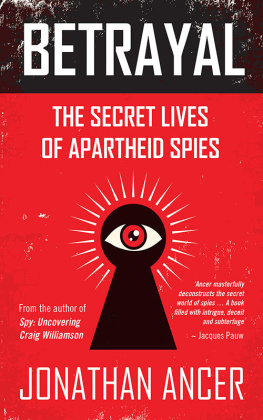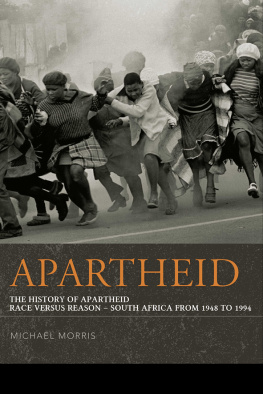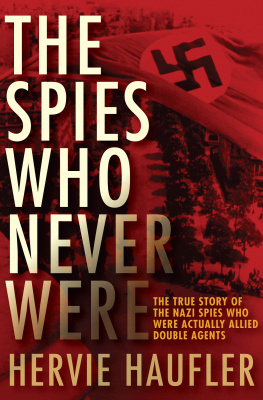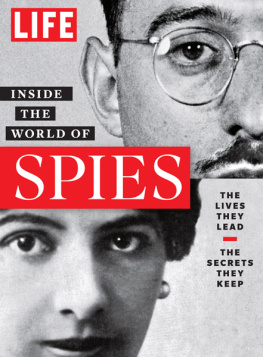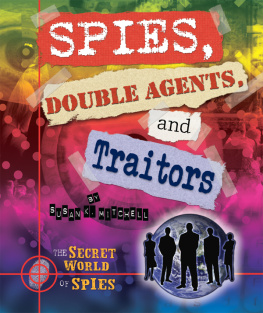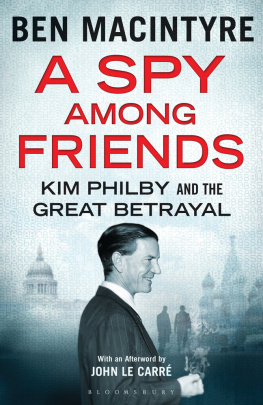BETRAYAL
THE SECRET LIVES
OF APARTHEID SPIES
JONATHAN ANCER
Tafelberg
For Mom and Dad, who taught me to value honesty, loyalty and integrity, dashing any hope I ever had of becoming a spy. And in memory of Kay Faust and Herman Caplan
INTRODUCTION
Why spy?
I arranged to meet a former South African secret agent to talk about South Africas espionage landscape. When he insisted on using coded messages to communicate, I thought he was being unnecessarily paranoid. But a week after our meeting I turned on the television to news of the attempted murder of Sergei Skripal, the Russian spy who had defected to Britains MI6. A few hours later I received a message from an anonymous number. It read: Now you know why Im paranoid.
In a scene straight out of a spy thriller, 66-year-old Skripal and his daughter Yulia, 33, were found slumped unconscious on a bench in Salisbury on 4 March 2018. They had been poisoned by a Russian military-grade nerve agent identified as Novichok. British soldiers in protective suits and masks combed the English cathedral town for clues, and investigators tried to figure out how the attack was carried out, and why.
The why is probably a little clearer. Someone was sending a message: Betray us and we will find you and we will kill you. British Prime Minister Theresa May believed that that someone occupied a powerful seat in the Kremlin; someone like Russian President Vladimir Putin, perhaps.
Putin, a former KGB officer himself who went on to head up the FSB, the post-Soviet successor to the KGB, has made it clear what he thinks of traitors. Traitors will kick the bucket. Trust me. These people betrayed their friends, their brothers-in-arms. Whatever they got in exchange for it, those 30 pieces of silver they were given, they will choke on them, he said in a television interview in 2010 after Alexander Poteyev, a colonel in Russias foreign intelligence service, defected to the West. Putin added: How can he [Poteyev] look into the eyes of his children? Pig.
Skripal was arrested in Russia in 2004 and sentenced to thirteen years in prison for spying for the UK, but was freed in a prisoner swap six years later. He retired to England to live a quiet life in Salisbury but, as he discovered, former spies do not get to live quiet lives. Unless they are former South African spies. When the countrys Truth and Reconciliation Commission of the 1990s presented an opportunity to shine a light on the dirty secrets of the past, spies did not have to come clean and they didnt. Most South African spies who operated during the apartheid era have scurried off into the darkness and remain undercover.
South Africa had thousands of intelligence agents working in various roles and in an assortment of agencies to protect the apartheid state. Hennie Heymans, a former Special Branch member who handled spies locally and abroad, said: We gave our agents the assurance that we would never blow their cover or divulge their identity. Our promise still stands. There are many apartheid agents as well as agents who worked for the liberation movement who have yet to be unmasked, and most will probably remain in the shadows forever.
I have long sought to understand what motivates someone to spy. Accordingly I went on a quest to track down those spies who have been unmasked to ask them why. I wanted to scratch at their betrayal and explore how they managed to build relationships of trust, and lead double lives, how they maintained the boundaries between their real identity and their spy legend. I also wanted to know what they think now a quarter of a century after the curtain came down on apartheid of their treachery, if they even considered what they did to be treacherous.
The spies I write about are all white and, except for one, Mark Behr, English-speaking. Afrikaners were invariably considered suspect among the white left, so it was mainly English speakers who were recruited to infiltrate anti-apartheid organisations.
I didnt set out to find only white agents. I found white spies for two reasons. Firstly, most black spies paid a much higher price than their white counterparts for their betrayal, and arent alive to talk about it. Whites who infiltrated the liberation movement and who were exposed got to live. Secondly, my quest was to understand what people thought about the choices they had made. The black apartheid agents were turned. In Askari: A Story of Collaboration and Betrayal in the Anti-Apartheid Struggle, author Jacob Dlamini tells the story of Comrade September, aka Glory Lefoshile Sedibe, an ANC activist who, after being brutally tortured, turned against the freedom struggle and became an apartheid agent. For askaris, turning was a choice between life and death, which, when you think about it, isnt much of a choice at all.
The spies in my book all made conscious decisions to infiltrate a target group and pretend to be someone they were not. Some may have been manipulated and some may not have fully grasped the consequences of what they were doing, but they all made a choice to set out on the road to deception. Perhaps after they had started their journey there was no turning back, but they all chose to take that first step.
Not all of the spies featured in the book worked for apartheid. Jenny Miles spied for Cuba and Roland Hunter, an anti-apartheid conscript, became an accidental spy for the ANC when he found himself in Military Intelligence. A significant portion of the book is about Dieter Gerhardt, the South African senior naval officer who spied for the Soviet Union. He was the longest-serving South African spy (that we know about, at least), and was considered one of the most important spies of the Cold War. His life has been remarkable and his story is fascinating.
Although some of the spies I tracked down refused to speak, others agreed to talk to me about how they account for the choices they made, and what they think of a life spent lying. All the same, as the paranoid former secret agent warned me, dont believe everything spies tell you; they are, after all, skilled in the art of deception.
CHAPTER ONE
Dieter Gerhardt
The Gray Man
I
England, 1963. A tall, athletic man with big green eyes and a disarming smile boarded the train from Portsmouth to London. Twenty-eight and already balding, he was a rising star in the South African Navy, and had been seconded to the Royal Navy for training. He got off at High Street and made his way to Kensington Palace Gardens. The walk took about ten minutes. He entered number 5 Kensington Gardens, the Embassy of the Union of Soviet Socialist Republics, and asked to see a military man. He was sent to a waiting room and a few minutes later a short, slim, dark-haired man walked in and asked what he wanted. The South African offered to spy for the USSR.
The Russian listened quietly and made no comment, except to say he would speak to his superiors. The naval officer then left the embassy. The Russians or any country, for that matter dont normally take a walk-in. Walk-ins are immediately suspicious. For all the Russians knew, he could have been a double or even a triple agent.
In 1963 the Cold War was in full throttle, and the Soviets and the West were gripped in an extraordinary spy dance. After the Second World War the rival intelligence agencies on both sides of the East-West divide had spared no expense in building their espionage capacities in an effort to penetrate embassies, government agencies, military personnel, political parties and, the ultimate prize, each other.
Following his visit, the South African naval officer didnt hear from the Russians. After a month he got back on the train and once again made his way to the Soviet Embassy. This visit would prove more fruitful. Firstly, the Russians had investigated him and now probably knew things about him that even he didnt know himself. And, secondly, he had arrived with significant material to put on the table. A former South African counter-intelligence chief, who spoke on the condition of anonymity, said the officer had returned with something hot; not chicken feed. In espionage jargon chicken feed is intelligence that is accurate but not particularly useful, and especially not damaging. Its fed to an opposition agency to try to establish a double agents credentials.

